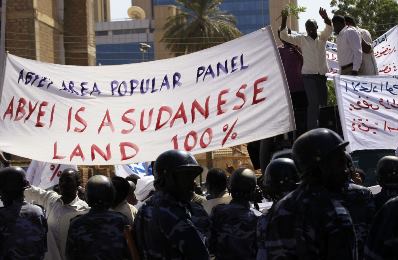Sudan’s Misseriya to hold counter-referendum in Abyei
October 29, 2013 (KHARTOUM) – The Misseriya tribe announced on Tuesday that it plans to organise its own unilateral referendum to determine the fate of the disputed area of Abyei in response to a unilateral vote organised by the Ngok Dinka.

The chairman of the group, Mahmoud Abdel Karim, said the vote will be open to all residents of Abyei without exclusion, adding that they had invited regional and international organisations to monitor the process and mobilised volunteers to participate in the process.
He called on the Sudanese, South Sudanese governments, as well as the African Union (AU) and the United Nations to recognise the result of the planned referendum.
The group’s secretary general, Ggor Deng, denounced the ongoing vote in in the region organised by the Abyei high referendum committee, saying they welcomed the outcome of the presidential summit in Juba and supported the establishment of a joint administration and legislative council in Abyei, as well as the police force.
In the 22 October meeting in Juba, Sudanese presidents Omer Hassan Al-Bashir and his South Sudanese counterpart, Salva Kiir, agreed to form temporary institutions and resume discussions over the organisation of a referendum in accordance with the 2005 Comprehensive Peace Agreement (CPA).
Both the AU and UN have expressed their disapproval of the vote organised by the Abyei community, calling for restraint amid fears it could ignite tensions between Sudan and South Sudan and stop the normalisation process, which the two governments are currently engaged in.
The Misseriya paramount chief, Mukhtar Babu Nimir, this week strongly criticised the unilateral referendum in Abyei, saying his people would own organise their process in order to ensure Abyei remained in Sudan.
“We will also organise a referendum similar [to the referendum of the Dinka Ngok] … If the result of their referendum is in favour of joining the South, we will organise a referendum to join the north”, he said in an interview with Al-Meghar newspaper on 25 October.
Nimir spoke extensively about the good neighbouring relations and coexistence between the two communities, accusing “intellectuals and politicians” within the Ngok Dinka of masterminding the unilateral referendum.
He stressed that many Ngok Dinka tribal leaders were opposed to holding the unilateral referendum.
In statements to the semi-official Sudanese Media Centre (SMC), Ngok Dinka tribal leader Zakeria Atem accused the Kush organisation of Deng Alor and Luka Biong of spearheading the referendum with the support of foreign groups, adding they will stand by the Misseriya to defend the area.
Observers agree that residents of the border area are now sharply divided between those who want to join South Sudan and those who are supportive of remaining in Sudan.
A scheduled referendum on Abyei in January 2011 as provided in the CPA failed to take place amid disagreements between Khartoum and Juba over who was eligible to participate.
The AU mediation panel has so far failed to broker an agreement between the two sides who have rejected all proposals put forward by the mediation team since 2010.
However, the African Union Peace and Security Council (AUPSC) expressed its support for the latest proposal made by the head of the mediation team, Thabo Mbeki, in September 2012 which maintained that only the permanently residing Ngok Dinka be allowed to take part in the plebiscite.
The proposition is in line with the position of the South Sudan which had rejected a proposal aiming to divide the region between the two countries.
The leaders of Abyei high referendum committee say they were forced to organise their own referendum after the two countries failed to strike a deal, saying there was no agreement over voter eligibility on the horizon.
The organisers, who have vowed to seek international support for the outcome of the process, say they are acting within the framework of the rule of the international arbitration court which provides that Abyei belongs to the nine chiefdoms of the Ngok Dinka.
The Misseriya have rejected the ruling and Nimir says they will continue to support the Sudanese government’s stance on the matter as long as it accords with their own position.
“Yes, we fully agree with the government in the north. This is why we do not want to disagree with them”, he said.
The Arab nomads, who fought against former rebels from South Sudan’s ruling Sudan People’s Liberation Movement (SPLM) before the signing of the CPA in 2005, say they are ready to defend their land if Khartoum accepts a referendum excluding them.
(ST)
